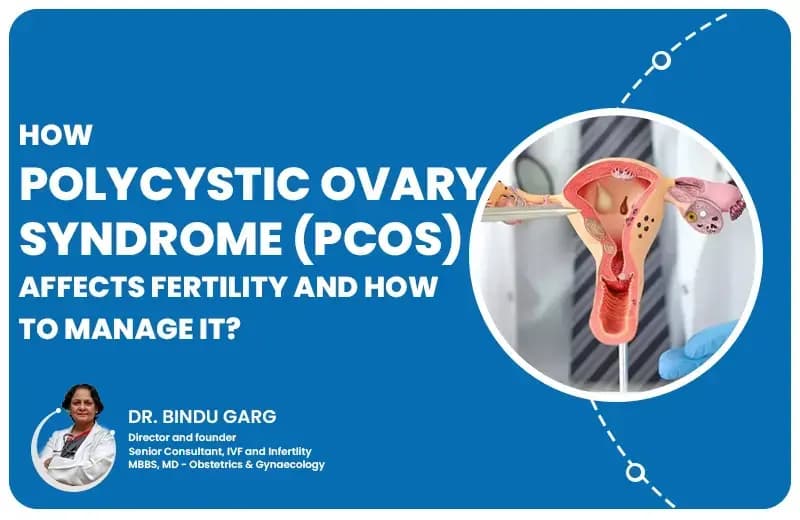
How Polycystic Ovary Syndrome (PCOS) Affects Fertility and How to Manage It
Polycystic Ovary Syndrome (PCOS) is a common hormonal disorder affecting many women globally. A significant concern associated with PCOS is its impact on fertility. Women with PCOS often face challenges in conceiving due to hormonal imbalances and related issues. This article explores how PCOS affects fertility and various management strategies to improve the chances of conception.
Understanding Polycystic Ovary Syndrome (PCOS)
What is PCOS?
PCOS is a condition characterized by an imbalance in reproductive hormones, leading to the formation of multiple small cysts on the ovaries. These hormonal imbalances can disrupt the regular ovulation process, making it difficult for women to conceive.
Symptoms of PCOS
The symptoms of PCOS can vary, but common signs include:
- Irregular or absent menstrual periods
- Excessive hair growth on the face and body (hirsutism)
- Acne and oily skin
- Weight gain or difficulty losing weight
- Thinning hair on the scalp
- Difficulty conceiving
How PCOS Affects Fertility
Hormonal Imbalances
In PCOS, the ovaries produce excess androgens (male hormones) and an imbalance of estrogen and progesterone. This disruption can prevent regular egg release, leading to irregular or absent ovulation.
Irregular Ovulation
Irregular or absent ovulation significantly affects fertility. Without regular ovulation, fertilization chances are reduced, making it challenging for women with PCOS to conceive naturally.
Insulin Resistance
Many women with PCOS also experience insulin resistance, where the body does not respond effectively to insulin. This condition exacerbates hormonal imbalances and contributes to fertility issues.
Ovarian Cysts
The small cysts on the ovaries in PCOS can interfere with normal ovarian function, potentially preventing egg release or affecting egg quality.
Diagnosing PCOS and Fertility Issues
Medical History and Symptoms
Diagnosis often begins with a detailed medical history and assessment of symptoms. Your healthcare provider will inquire about menstrual irregularities, hair growth patterns, and other related symptoms.
Blood Tests
Blood tests may check hormone levels, including androgens and insulin. Elevated levels can indicate PCOS and guide treatment options.
Ultrasound
An ultrasound of the ovaries may identify cysts and assess their condition, helping confirm the diagnosis of PCOS.
Management Strategies for PCOS and Fertility
Lifestyle Changes
Diet and Exercise
A healthy lifestyle impacts PCOS management and fertility. A balanced diet rich in fruits, vegetables, whole grains, and lean proteins, combined with regular exercise, helps manage weight and improve insulin sensitivity.
Weight Management
Maintaining a healthy weight regulates menstrual cycles and improves ovulation. Even modest weight loss can positively affect fertility.
Medical Treatments
Medications
Several medications can manage PCOS symptoms and improve fertility:
- Hormonal Birth Control: Regulates menstrual cycles and reduces symptoms like acne and excessive hair growth.
- Metformin: Improves insulin sensitivity and may restore regular ovulation.
- Clomiphene Citrate: Stimulates ovulation and increases conception chances.
Ovulation Induction
Fertility treatments such as ovulation induction help stimulate the ovaries to release eggs and increase the likelihood of conception for women with irregular ovulation.
Alternative and Complementary Therapies
Herbal Remedies
Some herbal supplements, like spearmint tea and inositol, may help with PCOS symptoms and improve fertility. Consult with a healthcare provider before starting any herbal treatments.
Acupuncture
Acupuncture has been explored as a complementary therapy for PCOS. Some studies suggest it may help regulate menstrual cycles and improve fertility.
Assisted Reproductive Technologies (ART)
For women with severe PCOS or who have not responded to other treatments, ART like IVF may be considered. IVF can bypass many challenges associated with PCOS and provide a viable path to conception.
Emotional and Psychological Support
Coping with Infertility
Infertility can be emotionally challenging. Support from a therapist or counselor specializing in infertility can help manage stress and provide coping strategies.
Support Groups
Joining support groups or online communities for women with PCOS offers emotional support and practical advice. Connecting with others who share similar experiences can be reassuring.
Conclusion
PCOS significantly impacts fertility, but with proper diagnosis and management, many women with PCOS can achieve successful pregnancies. Understanding how PCOS affects fertility and exploring treatment options can improve the chances of conception. Embracing lifestyle changes, seeking appropriate medical treatments, and accessing emotional support are all crucial in managing PCOS and enhancing fertility.
If you suspect you have PCOS or are struggling with infertility, consult with a healthcare provider to discuss your symptoms and explore personalized treatment options.
Content Created By:

CyberBizz Technologies
Team - Content Curator